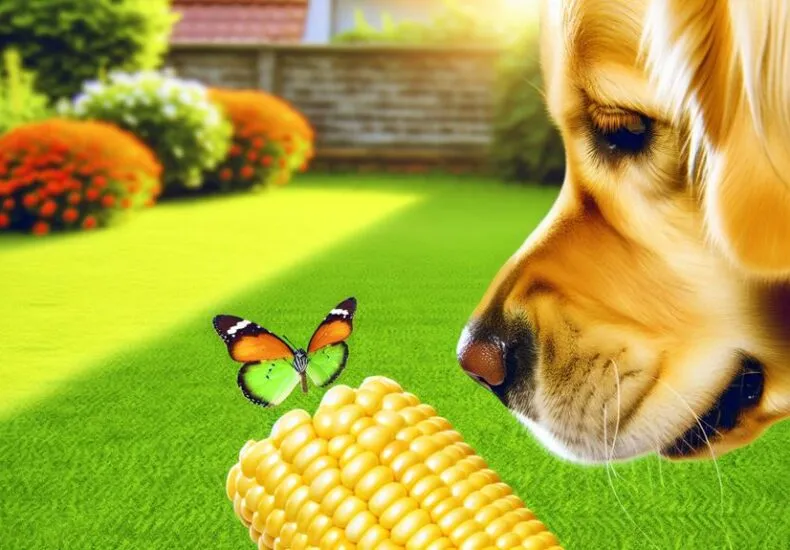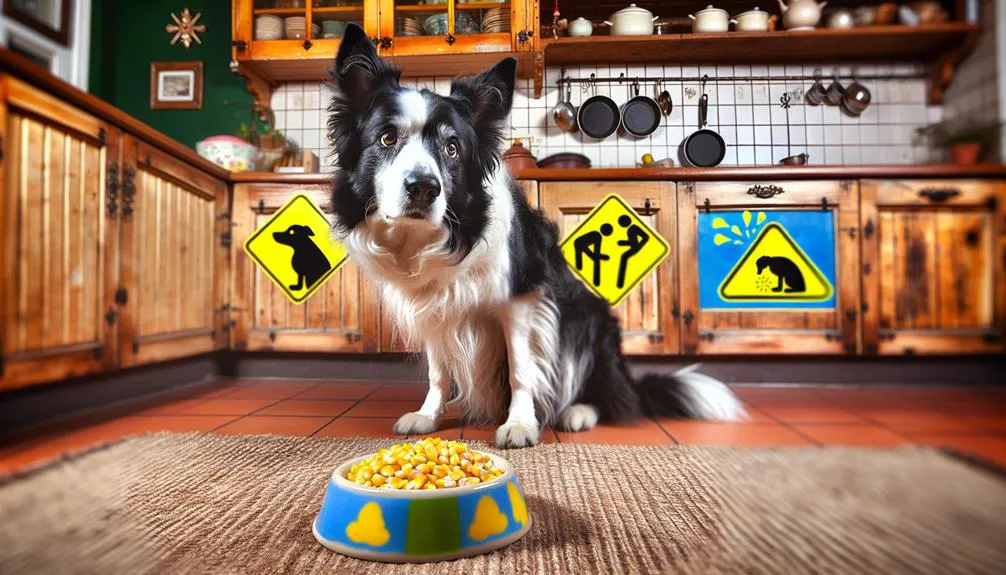
Can Dogs Eat Corn
It's a coincidence that just as you were pondering your dog's diet, you stumbled upon corn in your kitchen. You might be wondering whether it's safe to share this common staple with your furry friend. While corn can offer some Nutritional benefits, it's essential to understand both the advantages and potential risks involved. So, before you toss that corn cob to your pup, there are a few important considerations to keep in mind that could impact their health.
Nutritional Value of Corn
Corn, often considered a staple in many diets, offers a variety of Nutritional benefits that can be relevant to your dog's health. This grain is rich in carbohydrates, providing a readily available source of energy. Additionally, corn contains essential amino acids, which are essential for your dog's overall health as they support muscle development and repair.
When it comes to corn digestion, it's significant to mention that dogs generally digest corn well, especially when it's processed in the form of cornmeal or corn flour. The cooking process breaks down the tough outer casing, making it easier for your dog to absorb the nutrients. However, some dogs may experience challenges in digesting whole corn kernels, which can lead to gastrointestinal upset.
While corn can be beneficial, it's imperative to be aware of the potential for corn Allergies in dogs. Some dogs may develop sensitivities or Allergies to corn, leading to symptoms such as itching, skin irritations, or Digestive issues. If you notice any adverse reactions after introducing corn into your dog's diet, it might be wise to consult your veterinarian.
Benefits of corn for dogs
The inclusion of corn in a dog's diet can offer several significant benefits. First and foremost, corn is an excellent source of carbohydrates, providing your dog with the energy needed for daily activities. It can be particularly beneficial for active dogs that require a higher caloric intake. Furthermore, corn contains important vitamins and minerals, such as Vitamin B, which supports overall health and can aid in maintaining a shiny coat.
Another key advantage is that corn is relatively easy for dogs to digest, making it suitable for many pets. Good corn digestion can help support a healthy gastrointestinal tract, which is vital for nutrient absorption. Additionally, corn is often included in commercial dog foods, ensuring your dog receives a balanced diet.
However, it's important to be aware of individual sensitivities. While many dogs can benefit from corn, some may experience corn Allergies. If your dog shows signs of an allergic reaction, such as itching or gastrointestinal upset, it's necessary to consult your veterinarian.
Here are a few benefits of including corn in your dog's diet:
- Energy source: Provides carbohydrates for energy, especially for active dogs.
- Nutrient-rich: Contains essential vitamins and minerals that support overall health.
- Digestive support: Corn is generally easy to digest, promoting a healthy gastrointestinal system.
Risks of Feeding Corn

While many dogs can safely enjoy corn, there are notable risks associated with its consumption. One potential issue is the development of corn Allergies. Although relatively uncommon, some dogs can develop an allergy to corn, which may lead to symptoms like itching, skin irritations, or gastrointestinal distress. If you notice any of these signs after feeding your dog corn, it's crucial to consult your veterinarian promptly.
Another significant concern is the potential for Digestive issues. Dogs that consume corn in large amounts or in certain forms, like corn on the cob, may experience gastrointestinal blockages. The cob itself is indigestible and can pose a severe choking hazard or lead to intestinal obstruction, which is a medical emergency. Even when corn kernels are fed, they can be difficult for some dogs to digest, particularly if they're not chewed properly. This can result in upset stomach, diarrhea, or vomiting.
Moreover, corn is often included in many commercial dog foods, which can lead to overconsumption if you're not careful about Portion sizes. If your dog's diet is high in corn and lacks other necessary nutrients, it might result in an unbalanced diet, further exacerbating Health issues.
Types of Corn Safe for Dogs
Finding safe options for your furry friend can bring peace of mind, especially when it comes to incorporating corn into their diet. While some types of corn can be beneficial for dogs, it's important to know which forms are safe and how to avoid potential issues like corn Allergies.
Here are some types of corn that are generally safe for dogs:
- Fresh Corn on the Cob: Removing the kernels and offering them as an occasional treat can be a tasty snack. Just make sure the cob itself is kept away, as it poses a choking hazard.
- Popcorn: When prepared correctly, popcorn can be a fun treat for your pet. Ensure it's air-popped, unsalted, and free from butter or any harmful toppings. Always monitor for popcorn safety, as unpopped kernels can be a choking risk.
- Canned Corn: If you choose canned corn, opt for varieties without added salt or preservatives. Rinse it thoroughly to minimize any potential additives.
Always be cautious about introducing corn into your dog's diet, especially if they have a history of corn Allergies. Monitor for any signs of digestive upset or Allergic reactions after feeding. If you notice any concerning symptoms, it's wise to consult your veterinarian. With the right approach, you can safely share the joys of corn with your canine companion!
How to Prepare corn for dogs

Preparing corn for your dog requires careful consideration to guarantee it's both safe and enjoyable. First, you'll want to choose the right type of corn, such as fresh corn on the cob or canned corn without additives. Avoid any corn products that contain preservatives or added sugars.
When it comes to cooking methods, boiling or steaming corn is the best option, as these methods preserve its nutritional value while making it easier for your dog to digest. If you opt for corn on the cob, make sure to remove the kernels before serving, as the cob can pose a choking hazard or cause intestinal blockage.
Be sure to let the corn cool down before offering it to your dog. You can mash the kernels or cut them into smaller pieces to further reduce the risk of choking.
As for serving size, moderation is key. A small dog may only need a teaspoon or two of corn, while larger breeds can handle a tablespoon or so. Generally, corn should only make up a small portion of your dog's diet, ideally no more than 10% of their daily caloric intake. Always monitor your dog after introducing corn to their diet for any adverse reactions. If you notice any digestive upset, discontinue feeding corn and consult your veterinarian. By following these guidelines, you can safely incorporate corn into your dog's meals, providing them with a tasty and nutritious treat.
Alternatives to Corn in dog Diets
There are several nutritious alternatives to corn that can be safely included in your dog's diet. If you're looking for grain substitutes or vegetable options, consider incorporating these alternatives, which can provide essential nutrients while being easier on your dog's digestive system.
- Brown Rice: This whole grain is an excellent source of carbohydrates and provides energy. It's also rich in fiber, which aids in digestion. Brown rice is generally well-tolerated by dogs and can serve as a solid base for homemade meals.
- Quinoa: A complete protein, quinoa contains all nine essential amino acids, making it an excellent grain substitute for dogs. It's also gluten-free and packed with vitamins and minerals, including magnesium and phosphorus. Just verify it's cooked and served without any added seasoning.
- Sweet Potatoes: These nutrient-dense roots are not only a great vegetable option, but they also offer a wealth of vitamins, including A, C, and B6. Sweet potatoes are high in fiber and have anti-inflammatory properties, making them a healthy addition to your dog's meals.
When introducing any new food into your dog's diet, it's important to do so gradually. Monitor for any adverse reactions and consult your veterinarian for personalized advice. By incorporating these alternatives, you can create a balanced and varied diet for your furry friend, making sure they receive the nutrition they need while avoiding potential issues from corn.
Frequently Asked Questions
Can Puppies Eat Corn Safely?
When considering puppy nutrition, corn can be a safe treat in moderation. Ascertain it's cooked and free from additives. Always consult your vet before introducing new foods to your puppy's diet for peak health.
What Are Signs of Corn Allergies in Dogs?
If your dog shows signs like itching, gastrointestinal upset, or skin irritations, it might indicate corn allergy symptoms or corn intolerance signs. Observing these reactions after consuming corn can help you identify potential Allergies.
Is Cornmeal Safe for Dogs to Consume?
Cornmeal's generally safe for dogs in moderation, offering benefits like fiber and energy. However, consider alternatives like rice flour or oat flour, especially if your dog has Allergies or Digestive issues. Always consult your vet first.
Can Dogs Eat Corn on the Cob?
Think of corn on the cob as a puzzle; while dogs can eat corn, the cob poses risks. It can cause choking or digestive blockages, and it's not toxic, but proper corn digestion is essential.
How Much Corn Can I Give My dog?
When considering how much corn to give your dog, remember moderation's key. Small amounts can provide corn benefits, but too much may affect corn digestion, leading to gastrointestinal issues. Always consult your vet for personalized advice.
Conclusion
In summary, corn can be a safe and nutritious addition to your dog's diet when offered in moderation and prepared correctly. For instance, if your dog enjoys fresh corn on the cob during a family barbecue, just make certain to remove the kernels and avoid the cob to prevent choking. Always monitor for any adverse reactions and consult your vet before making significant dietary changes. By doing so, you can guarantee your furry friend stays healthy and happy.
You may also like
Archives
Calendar
| M | T | W | T | F | S | S |
|---|---|---|---|---|---|---|
| 1 | 2 | 3 | 4 | 5 | 6 | |
| 7 | 8 | 9 | 10 | 11 | 12 | 13 |
| 14 | 15 | 16 | 17 | 18 | 19 | 20 |
| 21 | 22 | 23 | 24 | 25 | 26 | 27 |
| 28 | 29 | 30 | ||||
Leave a Reply